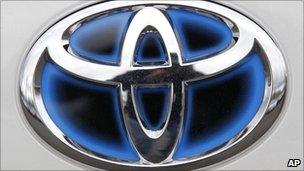Toyota halts Deeside production after supplies shortage
- Published

Production will be halted over several days at Toyota factory in Deeside
The Japanese car maker, Toyota, is to temporarily halt production at its engine manufacturing plant on Deeside, Flintshire.
The stoppage will happen for several days this month and next in five of the company's factories across Europe.
A total of 445 staff work at Deeside, and the company says the stoppage is due to a supply shortage from Japan, caused by the earthquake and tsunami.
It comes a day after the firm announced similar shutdowns in North America.
Both the vehicle factory in Burnaston, Derbyshire, and the Deeside engine plant will have a non-production day on 21 April.
Both sites will shut down on 22 April and remain closed for the three days between Easter Monday and the royal wedding public holiday on 29 April, returning to work on 3 May.
There will also be reduced production in May.
No decision has been made regarding production beyond the month of May, according to a company statement.
Tony Walker, deputy managing director of Toyota Motor Manufacturing UK, said: "We very much appreciate the strong support of our members in helping us manage this difficult situation."
The shutdown also affects Toyota's vehicle manufacturing plants Adapazari in Turkey, Valenciennes in France, and the engine plant in Jelcz-Laskowice in Poland.
'Just in time'
Dr Paul Nieuwenhuis, a director of the Centre for Automotive Industry Research at Cardiff Business School, Cardiff University, said: "The problem is they rely on parts coming in from Japan.
"They have not been affected by the earthquake for the last few weeks but now that this 'pipeline' [of parts] has come to an end, suddenly they are hit by this problem," he said.
Dr Nieuwenhuis said Toyota used a "just in time system" of supply which operated without a lot of slack in the system.
He said that once supply was stopped it did not take much time for plants around the world to be affected.
He said while the stoppages were not good news for Deeside and other plants, it was a temporary phenomena.
"It should take a few months to get back up to speed," he added.
Dr Raye Ng, senior lecturer in international business at Glyndwr University, Wrexham, warned that although Toyota's European stoppages affect April and May there was no guarantee supply problems would be resolved afterwards.
Regarding knock-on effects, he said we were only seeing the beginning of it.
He added that UK businesses should look to shift focus from being "at the other end" of the supply chain to prevent further problems from arising.
And he called on the automotive industry to place its emphasis on developing in areas such as research and development.
He called on businesses to "build on our strengths" and "strategically plan" over the next three to five years with regards to "widening our portfolio".
- Published12 April 2011